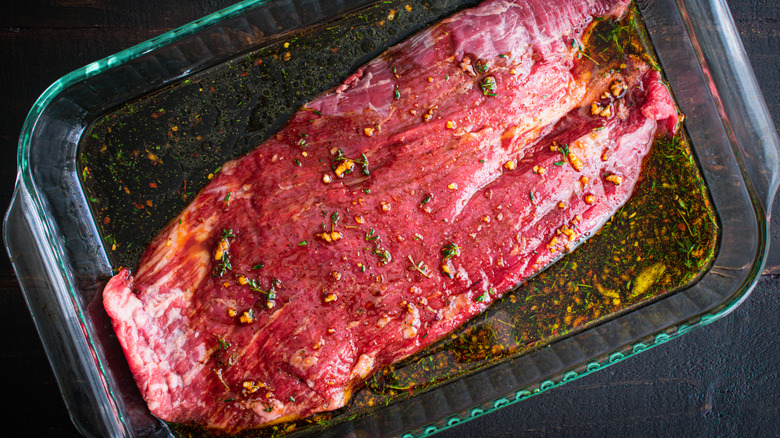When it comes to marinating your beef, poultry, or fish, there are a lot of opinions. For beef, if it’s sufficiently marbled, you may not need to marinate the meat at all — just a little salt and pepper will do. But certain leaner steaks can definitely take a marinade, and it will help tenderize them and add more juicy flavor. While poultry can handle a pretty long marinade, it’s generally recommended not to marinade it for longer than 24 hours, or it will start to break down the protein too much, giving you mushy meat. And because fish is the most delicate of the three, even 30 minutes or so is probably sufficient, and you don’t want to leave it for more than a couple hours. But if you’re using red or white wine vinegar in your marinade, which should you use for each protein?
We asked Russel Kook, the executive chef at The Bellevue in Chicago, to break it down for us. “Red wine vinegar brings a fruitier, bolder flavor that works well with the savory profile of steaks,” Kook says. “It adds a slight tang while enhancing the depth of the beef. White wine vinegar, on the other hand, is lighter and brighter — it’s better suited for poultry, fish, or vinaigrettes, where you want acidity without too much weight.”
It can be pretty much that simple — red wine vinegar with red meat, white wine vinegar with white meat. But there’s a little bit more to know before you get to marinating.
What else to know about marinating with red and white wine vinegar
First of all, when marinating with vinegar, there’s a simple ratio to follow: three parts oil to one part vinegar and one part seasoning (herbs, aromatics, or more flavorful salty goodness, like soy sauce). And if you find cloudy bits floating in your store-bought red wine vinegar, it’s nothing to worry about, it just shows that the vinegar is still fermenting and is perfectly okay to use.
As Russel Kook mentioned, red wine vinegar lends itself more to red meat. “It has a deeper, more robust flavor profile that complements the richness of beef,” he says. “It enhances without overpowering, especially when used in balance with other ingredients.” White wine vinegar is the opposite: It’s bright and zingy, almost effervescent, giving acidic overtones rather than undertones.
But if you find that it’s time to make a marinade and you’re working on a steak and only have white wine vinegar, or you’re prepping poultry or fish and only have red wine vinegar, can you switch them up? Sure, just be sure to understand your flavors. White wine vinegar with your steak will give it an interesting twist, a little more tang and sweetness. And using a red wine vinegar with poultry or even fish will give them deeper flavor and boldness. It is recommended to only use red wine vinegar with meatier, heartier fish that can handle the more pronounced, fruity flavor, so you’re not overpowering a light and delicate fish.
If you’d like to make your own vinegar at home, you can transform leftover wine into red wine vinegar in just a few steps. But, when it comes to the marinade, you should probably trust the experts, like Russel Kook. If you’re in a pinch, you can switch them up, but be sure to get familiar with your flavors first.






